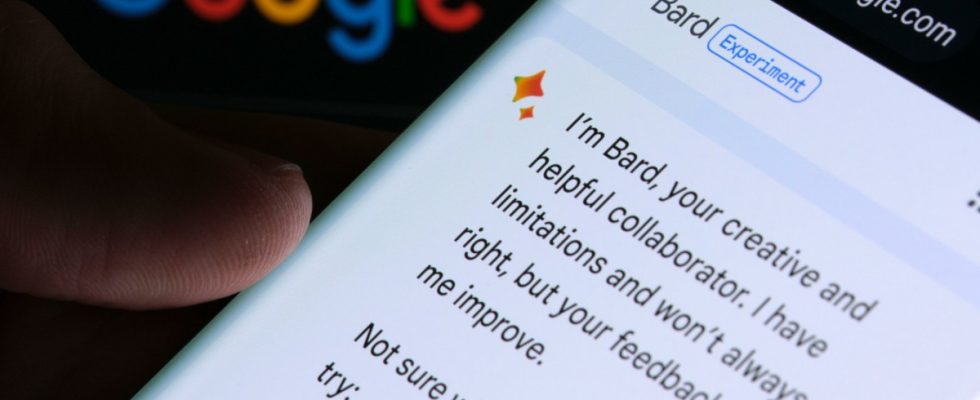Google made it on the third attempt: the chatbot Bard was launched in the countries of the European Union. With that you can too try people in Germany, how it compares to Microsoft’s Bing and OpenAI’s ChatGPT. In March, Bard was initially released in the USA and Great Britain, the EU was left out. Then it should be ready in June, but the Irish data protection authority reported a need for discussion.
Google now seems to have calmed the concerns. From now on you can talk to Bard without using a VPN to pretend to be outside the EU. The chatbot now speaks German and more than 40 other languages. Until now, Bard only spoke English, Japanese and Korean. Simultaneously with the launch in the EU, the service will gain new capabilities. In the future, you can have answers read out to you, adjust the tonality, pin conversations and upload images that Bard then processes.
Such gimmicks are worthless if the answers themselves are worthless. Google had some catching up to do in the beginning. Bard launched several months later than ChatGPT, and Google takes every opportunity to emphasize the importance of using artificial intelligence responsibly.
More math than intelligence
Chatbots like Bard or Bing are based on language models that are trained with huge amounts of text. Google recently changed its terms of serviceto grant themselves the right to AI models to feed almost anythingwhat people write publicly on the net. The text machines string together words that appear in similar contexts in the training material. That has a lot to do with mathematics and little to do with real intelligence. Accordingly, the language models sometimes produce answers that sound convincing but are completely wrong.
In this regard, Bard is no different from ChatGPT and Bing. In fact, the name already shows what to expect. Human bards compose and entertain, truthfulness to the facts is not one of their core competencies. Jack Krawczyk, who leads the development of Bard at Google, speaks of an “AI experiment in the early stages” and calls the chatbot a “storyteller”. That sums it up well: Bard has a thriving imagination, and you can’t rely on the answers.
The chatbot openly admits this. “ChatGPT is more accurate when it comes to factual tasks, while my strengths lie in understanding and reasoning,” Bard describes the difference between the services. But the difference is not that big, both chatbots mix useful with nonsense. Bard has the advantage that it can access Google’s search index in real time and spit out current information.
Chatbots divulge private information
After months of hype, enthusiasm for AI has waned again. Finally they went Hit numbers on ChatGPT back. This could partly be due to the semester breaks, students use the language models particularly intensively. In addition, most websites have fewer visits in the summer months, and the sun and sea are more tempting than smartphones. Perhaps some people have also noticed that chatbots have so far brought them little added value in everyday life.
That could change in the future. Corporations like Google and Microsoft are investing billions in AI, and hundreds of start-ups are raising huge amounts of venture capital. No technology develops faster, new models are released every month. In its early stages, Bard was based on the Lamda language model, followed by the more powerful Palm 2. A project called Gemini is currently being worked on, which aims to outperform ChatGPT.
If you want to try out what Bard can do and where its limits lie, you should be careful. In June Google warned its employees, Bard and ChatGPT with confidential information. Similar guidelines exist at Samsung, Amazon, Apple and Deutsche Bank. Because everything you tell a chatbot serves as training material – and could end up in an answer to another person’s question.

